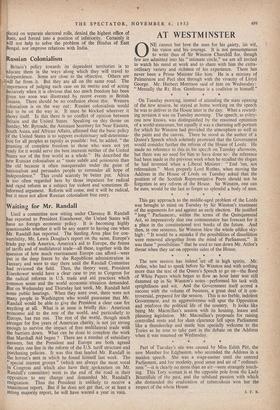Waiting for Mr. Randall
Until a committee now sitting under Clarence B. Randall has reported to President Eisenhower, the United States will have no foreign economic policy. It is becoming highly questionable whether it will be any nearer to having one when Mr. Randall has reported. The Sterling. Area plan for con- vertibility, Mr. Lewis Douglas's report on the same, Europe's trade gap with America, America's aid to Europe, the future of tariffs and of multilateral trade—all these, together with the question of hdw much rearmament Europe can afford—were put in the deep freeze by the Republican administration in January and were to stay there until the Randall Committee had reviewed the field. Then, the theory went, President Eisenhower would have a clear case to put to Congress for the radical reforms in U.S. trade and aid practices which common sense and the world economic situation demanded. But on Wednesday and Thursday last week, Mr. Randall held some public hearings. When they were over, there were not many people in Washington who would guarantee that Mr. Randall would be able to give the President a clear case for anything at all. What is at issue is briefly this : American economic aid to the rest of the world, and particularly to europe, has run out. The rest of the world, though much stronger for five years of American charity, is not yet strong enough to survive the impact of free multilateral trade with the barriers down. What can be done to complete the work that Marshall Aid began ? There are a number of subsidiary answers, but the President and Europe are both agreed the main one lies in the reform of the U.S. tariff structure and purchasing policies. It was this that landed Mr. Randall in the hornet's nest in which he found himself last week. The " special interest groups " (which are always the most vocal in Congress and which also have their spokesmen on Mr. th Randall's' committee) went to the end of the road in their opposition to any change and demanded Mr. Randall's resignation. Thus the President is unlikely to receive a unanimous report. But if he does not get that, or at least a strong majority report, he will have wasted a year in vain.


































 Previous page
Previous page